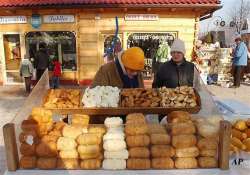Cheese was first made 7,500 years ago
London: Little Miss Muffet could have been separating her curds and whey 7,500 years ago, according to a new study that finds the earliest solid evidence of cheese-making. Scientists performed a chemical analysis on fragments

London: Little Miss Muffet could have been separating her curds and whey 7,500 years ago, according to a new study that finds the earliest solid evidence of cheese-making.
Scientists performed a chemical analysis on fragments from 34 pottery sieves discovered in Poland to determine their purpose.
Until now, experts weren't sure whether such sieves were used to make cheese, beer or honey.
Though there is no definitive test for cheese, Richard Evershed at the University of Bristol and colleagues found large amounts of fatty milk residue on the pottery shards compared to cooking or storage pots from the same sites.
That suggests the sieves were specifically used to separate fat-rich curds from liquid whey in soured milk in a crude cheese-making process.
"It's a very compelling forensic argument that this was connected to cheese," Evershed said.
"There aren't many other dairy processes where you would need to strain," he said.
He and colleagues weren't sure what kind of milk was used, but said there were lots of cattle bones in the region.
The study was published online Wednesday by the journal Nature.
"This is the smoking gun," said Paul Kindstedt, a professor of nutrition and food sciences at the University of Vermont and author of "Cheese and Culture." He was not involved in the study.
"It's almost inconceivable that the milk fat residues in the sieves were from anything else but cheese," Kindstedt said, adding that many experts suspected cheese was being made in Turkey up to 2,000 years earlier than this latest finding in Poland but that there was no definitive proof.
He said the discovery of cheese making marked a major development for Neolithic people and gave them a survival advantage by allowing them to turn milk into a form that provided essential calories, proteins and minerals.
At that time, the adult population was largely lactose intolerant, so making a product with less lactose, like cheese, allowed everyone to digest the nutrients in milk.
Kindstedt said the earliest cheeses were likely similar to spreadable cheeses like ricotta and fromage frais.
He guessed that people either ate them soon after they were made or buried them in pots for months afterwards, saving them for the winter when food was scarce.
Cheeses also served to spice up the Neolithic diet.
"Food was incredibly dull and monotonous," Kindstedt said, noting the prehistoric farmers' dependence on grain porridge.
After being buried in the ground for months, he said, the cheeses would have been non-perishable, "bomb-proof" and pretty pungent.
"They probably would not be the first choice for a lot of people today," Kindstedt he said. "But I would still love to try it."
Scientists performed a chemical analysis on fragments from 34 pottery sieves discovered in Poland to determine their purpose.
Until now, experts weren't sure whether such sieves were used to make cheese, beer or honey.
Though there is no definitive test for cheese, Richard Evershed at the University of Bristol and colleagues found large amounts of fatty milk residue on the pottery shards compared to cooking or storage pots from the same sites.
That suggests the sieves were specifically used to separate fat-rich curds from liquid whey in soured milk in a crude cheese-making process.
"It's a very compelling forensic argument that this was connected to cheese," Evershed said.
"There aren't many other dairy processes where you would need to strain," he said.
He and colleagues weren't sure what kind of milk was used, but said there were lots of cattle bones in the region.
The study was published online Wednesday by the journal Nature.
"This is the smoking gun," said Paul Kindstedt, a professor of nutrition and food sciences at the University of Vermont and author of "Cheese and Culture." He was not involved in the study.
"It's almost inconceivable that the milk fat residues in the sieves were from anything else but cheese," Kindstedt said, adding that many experts suspected cheese was being made in Turkey up to 2,000 years earlier than this latest finding in Poland but that there was no definitive proof.
He said the discovery of cheese making marked a major development for Neolithic people and gave them a survival advantage by allowing them to turn milk into a form that provided essential calories, proteins and minerals.
At that time, the adult population was largely lactose intolerant, so making a product with less lactose, like cheese, allowed everyone to digest the nutrients in milk.
Kindstedt said the earliest cheeses were likely similar to spreadable cheeses like ricotta and fromage frais.
He guessed that people either ate them soon after they were made or buried them in pots for months afterwards, saving them for the winter when food was scarce.
Cheeses also served to spice up the Neolithic diet.
"Food was incredibly dull and monotonous," Kindstedt said, noting the prehistoric farmers' dependence on grain porridge.
After being buried in the ground for months, he said, the cheeses would have been non-perishable, "bomb-proof" and pretty pungent.
"They probably would not be the first choice for a lot of people today," Kindstedt he said. "But I would still love to try it."